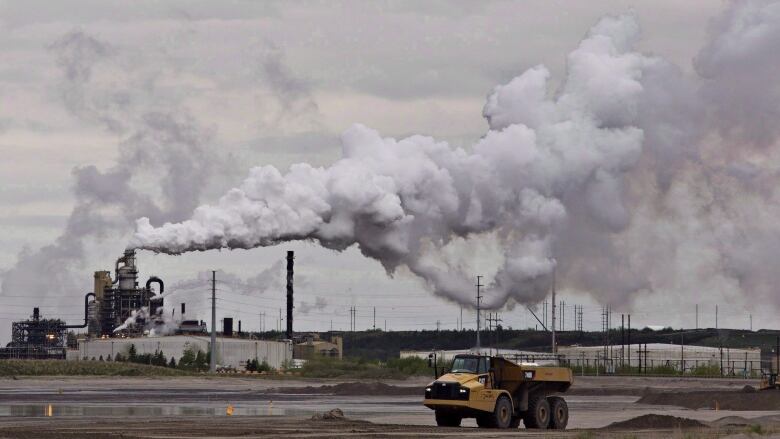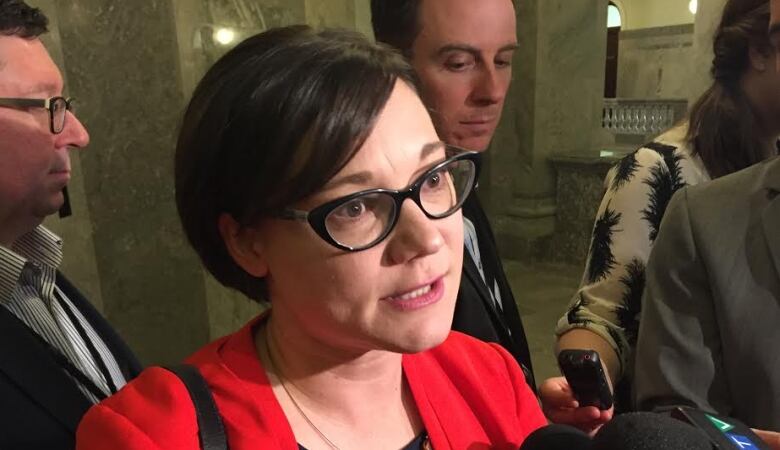Alberta defends carbon tax as report calls it aggressive
Minister says it's about taking a leadership position on a critical file

A report comparing Canadian jurisdictionsthat saysAlberta's carbon tax regimeis set to be themost aggressive system in thenext four years is sparking renewed calls from government critics to scrap the plan.
JasonKenney, whohopes to lead the struggling provincial Progressive Conservatives backto power by uniting the right,says Alberta's carbon tax regime is nothing to celebrate.
- Alberta carbon tax regime to be most stringent in Canada, Ecofiscal Commission report says
- The Strategists: How Alberta's NDP can navigate new carbon tax report
"Soon, the NDP will be taking billions of dollars out of hardworking Albertan's pockets, forcing them to pay more on everything from heating their homes, to fueling their cars, to even the cost of buying groceries," Kenney said in a statement on Wednesday.

A report released this week by Canada's Ecofiscal Commission concludes Alberta's plan will be even more aggressive than B.C.'s plan by the year 2020.
Alberta's opposition WildroseParty says thecarbon tax and climate plan will putup to 15,000 jobs at riskand could drophousehold income by $4 billion.
"An aggressive carbon tax that simply squeezes families and businesses for every spare penny will not help people pay their mortgages or get back to work. Without acting in concert with competing economies here in North America, this tax will just make it more difficult for our economy to recover," Leader Brian Jean said earlier this year.
- Alberta's carbon tax: What we still don't know
- Alberta's carbon tax steers clear of making airlines pay
- Carbon tax will cost Alberta families at least $1,000, Wildrose says
British Columbia was the first province to impose a carbon taxin 2008, but because 30 per cent of the provincial economy isn't exposed to B.C.'s current $30-per-tonne tax, the effective tax rate is more like $21 per tonne, says the study.
Alberta's new, broader carbon tax will eclipse it by 2020, coming in at $23.40 per tonne.
The minister responsible for Alberta's Climate Change Office, however, says push back by some is routed in old ideas.

"Mr. Kenney belongs to, now a caucus, previously a government, that denied the science of climate change and refused to do anything about the issue and therefore frustrated Alberta's efforts to get our product to tidewater frustrated Alberta's efforts to develop our oilsands responsibly," Shannon Phillips told CBC News.
"That is a view that is stuck in the past."
A Calgary economist says not pricing carbon could cost more in the long run, depending on which alternative a government chooses.
"So, the question of whether lowering emissions will affect Alberta's economy is: absolutely yes," Trevor Tombe said. He's an assistant professor of economics at the University of Calgary.

"But the alternative is a regulatory approach to achieve the same emissions reductions [that] would hurt Alberta's economy worse. So, doing nothing is certainly cheaper, but I'm not sure that's what most Albertans would want the government to do."
Tombe says the best way to reduce emissions is putting a price on carbon.
- Carbon tax would be good for P.E.I., says climate expert
- Carbon tax should be higher, say 130 B.C. businesses in letter to Christy Clark
"If the goal is to lower emissions then the most efficient way of doing that is by pricing them and letting the market sort out the details of how to lower the amount of greenhouse gas emissions, let households and firms decide on what the cheapest way to lower emissions are," he said.
"The alternative is a regulatory approach where the government itself picks what technologies businesses should adopt or what type of light bulbs households should buy, that sort of thing. And that's quite a bit less efficient than pricing carbon."
Kenney disagrees, saying if elected he would get rid of carbon pricing.
"The job-killing carbon tax will only drive more employers out of our province. We need to unite all Albertans in order to ensure the NDP is not re-elected. Only then will we be able to eliminate the carbon tax," he said.
Phillips said her government istaking a leadership position on a critical file.
"We need to ensure our economy is resilient into the future. You know, burying our heads in the sand is an economic dead end for this province," shesaid.
"Alberta has moved forward so that solutions are not imposed upon us."
- MORE ALBERTA NEWS |Man charged in death of Lethbridge baby boy
- MORE ALBERTA NEWS |5 impaired drivers charged in busy weekend for Red Deer RCMP
With files from CBC's Allison Dempster, The Canadian Press












_(720p).jpg)


 OFFICIAL HD MUSIC VIDEO.jpg)
.jpg)



























































































